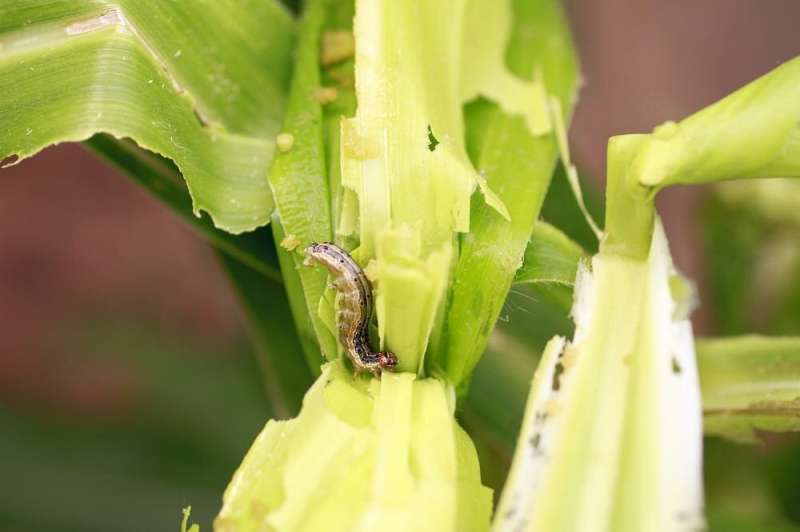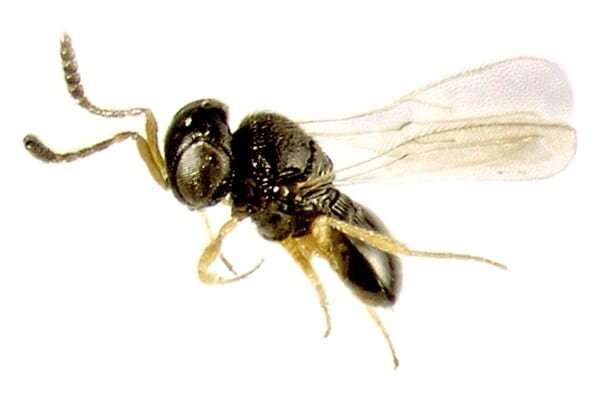Fall armyworm is seriously threatening food security as a pest of cereals. Credit: Daniel Adjokatcher
The 'net' is closing in on more viable biological control agents to fight the scourge of the fall armyworm (FAW) pest which is already wreaking havoc in most African countries as well as more than a dozen Asian countries including China and India.
CABI scientists teamed up with colleagues from the International Institute of Tropical Agriculture (IITA) and the Plant Protection and Regulatory Services Directorate (PPRSD) in Ghana to conduct new research which is another step closer to finding more biological control options to fight the FAW menace.
The Food and Agriculture Organization of United Nations (FAO) states that, based on 2018 estimates from 12 African countries, up to 17.7 million tonnes of maize could be lost annually to FAW on the continent—enough to feed tens of millions of people. The most direct impact of these losses falls on smallholder maize farmers, most of whom rely on the crop to stave off hunger and poverty.
Lead authors Dr. Lakpo Koku Agboyi, Dr. Georg Goergen and Dr. Marc Kenis led new research which focused on exploring the parasitoid complex of the FAW in Ghana and Benin where 10 species were found to have parasitized the pest. These included two egg parasitoids, one egg-larval, five larval and two larval-pupal parasitoids. In similar surveys carried out in Ethiopia, Kenya and Tanzania, seven parasitoid species were collected.
Outlining their findings in the journal Insects, the authors showed that the three most abundant parasitoids in both countries were two Braconidae: the egg-larval parasitoid Chelonus bifoveolatus and the larval parasitoid Coccygidum luteum, as well as the egg parasitoid Telenomus remus.
Dr. Agboyi, who is based at CABI's centre in Ghana, said, "We determined the larval parasitism rates in three Ghanaian regions and averages varied from 5% to 38% between regions, with up to 75% parasitism found at single locations. This data provides an important baseline for the development of various biological control options for fall armyworm."
The egg parasitoid Telenomus remus can be used as a biological ‘weapon’ against the fall armyworm. Credit: Andrew Polaszek/NHM/Imperial College
Back in April 2019 Dr. Kenis was lead author on another paper in Insects which confirmed the first report of Telenomus remus in Africa and positioned the species as a 'great opportunity for the rapid deployment of a biological control agent' for fall armyworm on the continent.
The latest research adds weight to the scientists' suggestion that Chelonus bifoveolatus, Coccygidum luteum and Telenomus remus could all be used to fight the fall armyworm as part of an Integrated Pest Management plan, either as augmentative biological control agents through regular releases or in conservation biological control strategies in which cultural practices enhance the action of the main natural enemies.
Dr. Kenis said, "In Latin America, field releases of Telenomus remus in maize can result in 80-100 percent parasitism, providing full control of fall armyworm. However, a challenge of using a larval parasitoid of fall armyworm in augmentative biological control will be to find alternate rearing hosts for mass production. Fall armyworm is not suitable for the mass production of larval parasitoids due to the cannibalistic behaviour of the larvae".
"Another consideration for a wider utilisation is to provide a product that is financially affordable for African farmers. Mass production on its natural hosts is costly but we believe rearing systems on factitious hosts can be developed."
"Understanding the parasitoid complex of the fall armyworm in Africa is also necessary before any development of classical biological control involving the introduction of parasitoids from the Americas. However, since FAW remains a huge problem for African farmers despite substantial parasitism by native parasitoids, the introduction of American parasitoids should not be ruled out since their successful establishment may lower pest population levels permanently, at no cost for the farmers."
Dr. Agboyi adds that the use of broad-spectrum insecticides is not only unsustainable in the long-run, but also increases production costs, has biodiversity and environmental impacts, and poses health risks to the growers and consumers.
Biological control, on the other hand they say, can offer an economically and environmentally safer alternative to synthetic insecticides that are currently being used for management of the fall armyworm and a range of other crop pests.
More information: Agboyi et al, Parasitoid Complex of Fall Armyworm, Spodoptera frugiperda, in Ghana and Benin, Insects (2020). DOI: 10.3390/insects11020068
Provided by CABI

























